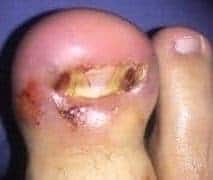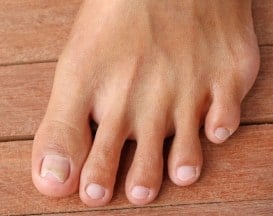
Do’s and Dont’s of Treating Infected Ingrown Toenails
You can get into a lot of trouble treating infected ingrown toenails at home. Here’s how:
1. Digging at the nail opens small cuts into the skin , allowing bacteria to get inside the skins protective shield, increasing your chances of infection.
2. If you remove a small part but not all of an ingrown nail, often a deep spike on the side continues to grow and can even grow out of the top of the toe flesh, creating a much more painful and harder to treat situation.
3. Home tools are often inadequately cleaned and kept in the bathroom- not the cleanest room in the house.
4. Thinking you “got it all” often delays professional treatment, again leading to worse infected ingrown toenails and more advanced treatments.
So my advice is make an appointment with a Podiatrist as soon as you feel a problem starting. While waiting for your appointment here are a few tips on home treatment of ingrown toenails to take the edge off the pain. However, Beaver Valley Foot Clinic often has same day and next day appointments so the problem is taken care of quickly and ending your suffering immediately!
To reduce inflammation and tenderness, soak your infected ingrown toenails several times a day for 10-15 minutes in lukewarm water Epsom salts help.
After soaking, dry the toe and apply antibiotic ointment and a bandaid to reduce local infection.
Wear shoes that dont press on the sore toe, like sandals or wider shoes until its better.
Ibuprofen or Tylenol may help temporarily, but be careful you aren’t masking the pain, allowing the infection to worsen before you get treatment.
Preventing an Ingrown Toenail:
Trim toenails even with tips of toes. Shoe pressure can damage the nail bed.
Wear proper fitting shoes. Heels should not be over 1/2 inch, and the wider the toe box, the better
Cut your nails straight across. Don’t let a salon cut your cuticles, they are important for keeping germs out.
Don’t go barefoot outdoors. If your work puts you at risk of injuring your toes, wear protective footwear, such as steel-toed shoes.
Check your feet. If you have diabetes, have a friend, or use a mirror if needed, but check your feet every day for signs of redness, scrapes or other foot problems.
What Causes Infected Ingrown Nails?
Only fungus or bacteria can infect your ingrown nail.
here are some of the factors that can help germs and bacteria help infect your ingrown nail so easily:
1. Walking Barefoot
When you have foot problems you must not walk barefoot at all, its really dangerous.
This way many bacteria, germs and fungus gets a good chance to reach your ingrown nail injury and infect it easily.
To avoid such situation always wear shoes before going out and wear socks at home I necessary.
2. Leaving Ingrown Toenail Untreated For Too Long
If you are delaying your ingrown nail’s treatment because you think its going to heal on its own then you are wrong.
No matter how much you wait this problem will not be solved at all.
the ingrown nail will keep growing inside your skin which will increase the injury even more.
A non-healing injury can lead to infections so fast, bacteria will enter through the injury then the infection will start.
They can even infect your bone and cause you bone infection or they may enter your blood stream that will spread injection in your whole body.
therefore you must not ignore your ingrown toenail for too long.
When To See a Doctor?
You should look for a doctor if you notice any of these symptoms:
• Formation of pus in the injury
• Swelling and redness around the injury
• Fever or chills
• Pain on the toes
How Doctors Treat Infected Ingrown Toenails?
When you visit your doctor they will put a splint under your nail to so that it stops growing inside your skin.
In some cases they may cut some part of your nail and then they will use anti-bacterial medicines for your infections.
How does toenail fungus affect individuals with diabetes or compromised immune systems?
Toenail fungus can pose additional risks for individuals with diabetes or compromised immune systems. Here’s how:
- Delayed Healing: Diabetes can impair blood circulation and compromise the immune system’s ability to fight infections. As a result, individuals with diabetes may experience delayed wound healing, making it harder for the body to combat toenail fungus infections. This delay increases the risk of complications.
- Increased Risk of Infection: People with diabetes are more prone to infections due to high blood sugar levels, which create a favorable environment for fungal growth. Additionally, individuals with compromised immune systems, such as those undergoing chemotherapy or with HIV/AIDS, are more susceptible to infections, including toenail fungus.
Is it possible to permanently eradicate toenail fungus, or does it tend to recur?
While it is possible to treat toenail fungus effectively and achieve long-term clearance, complete eradication and prevention of recurrence can be challenging for some individuals. Here are some key points to consider:
- Treatment Success: With appropriate treatment, many people can successfully clear toenail fungus and achieve healthy nail regrowth. Treatment options include oral antifungal medications, topical antifungal creams or solutions, medicated nail polish, and laser therapy. However, treatment success rates vary depending on the severity of the infection, individual response to treatment, and adherence to treatment protocols.
- Recurrence Risk: Toenail fungus has a tendency to recur, especially in individuals with certain risk factors such as diabetes, compromised immune systems, or repetitive exposure to fungal environments (e.g., communal showers). Even after successful treatment, there is a risk of reinfection if preventive measures are not taken.
- Preventive Measures: To reduce the risk of toenail fungus recurrence, it’s important to practice good foot hygiene, keep feet clean and dry, wear breathable socks and shoes, avoid walking barefoot in public areas, and regularly inspect and trim toenails.
READY TO SCHEDULE AN APPOINTMENT?
Call us today 878-313-3338 to schedule at any of our four Podiatry Clinics in Beaver, Butler, or Allegheny County locations, including Podiatry offices Moon Township, Ambridge, Cranberry Township’s full service Podiatric office and our newest Foot Clinic, Beaver, PA
Call now to talk to a foot care specialist 878-313-3338 ( FEET)
Click Here to E-mail Dr. Christina Teimouri
DISCLAIMER: email and contact forms not Monitored for emergencies;

